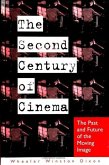While agreeing that the "digitization" of the cinema is inevitable, and even a necessary adjustment to the economic realities of end-of-the-millennium cinema production, Dixon argues that it represents a fundamental representational shift in the relationship between the spectator and the image-production apparatus of the cinematograph. More than ever all visual input is merely raw material which is then subjected to digital "polishing" and "tweaking" until it attains a sheen of artificial splendor that is utterly removed from the photographic reproduction of the object and/or person originally photographed.
Hinweis: Dieser Artikel kann nur an eine deutsche Lieferadresse ausgeliefert werden.
Hinweis: Dieser Artikel kann nur an eine deutsche Lieferadresse ausgeliefert werden.








